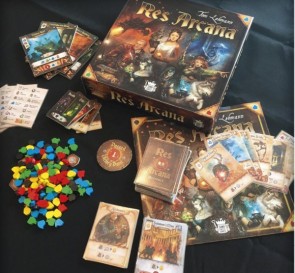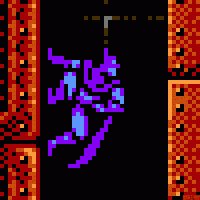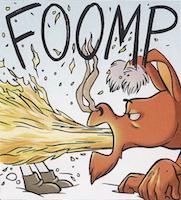The best game of 2019 - so far!
Res Arcana, Tom Lehmann's newest design, might just be his masterpiece. It takes a lot to blow me away these days, but Mr. Lehmann apparently figured out the right combination to do exactly that. This is an innovative, evolutionary design with fresh ideas and a razor-sharp focus. It's a lean set of rules and mechanisms that uses a brilliant combination of modular elements to create satisfying, compelling gameplay. You might be inclined to peg this as another resource conversion or tableau-building game and to some degree you'd be correct, but I don't think I've ever played a game in this design space that manages to balance accessibility with intricacy so well.
The core innovation of this game is that each player, representing a different type of Mage, gets an 8-card micro-deck of Artifact cards from a set of 40. They are all unique, and anything not used goes back in the box. There are two ways to go about distributing these: you can just do a plain old deal or you can use some variant drafting rules for more control. These 8 Artifacts and your Mage's special ability are all you start with aside from a seed account of one of each of the four essences and a gold nugget- and you never get any more Artifacts. Artifacts have a variety of effects ranging from converting or banking essences, discounts, sacrifice effects, card draws, and so forth and the goal is to have at least ten points across your Artifacts and other holdings in your tableau. Essentially, the cards represent the eight actions you have available for the game, and these must be effectively "unlocked" by paying essences. This creates the central sense of progression and development, which sometimes doesn't go the way you might expect based on what opportunities are available.
You might find that your Druid, who should theoretically be leveraging the power of Life essences and using her ability to untap creature Artifacts, winds up trucking in the darker arts far from the wild. Or your Alchemist might wind up with a few cards that play off of his innate ability to turn essences into gold, which you can parlay into Monument purchases. Perhaps your deck included a couple of high-cost Dragons, which allow you to force other players to lose essences and you'll want to look for combos and other effects that help get them onto the table quickly. It can happen that none of your cards, when played to the table for their cost in essences, generate any resources during the Gathering phase, forcing you to look elsewhere for income. Each turn, players also get to choose a Magic Item tile from an assortment of 8, which sort of guarantees the availability of a few core actions- passing first in a round gives you first pick out of these, which can be crucial.
But it's not all about the Artifacts. There are 5 expensive Places of Power available for purchase from a common row, each of which tends to offer a stronger-than-usual ability to convert essences to points or to generate other effects consistent with the game's core schematics. There are also two available Monuments, which can be purchased only with Gold and these give points or other effects. But you may never need either of these - it all depends on what you are doing with your micro-deck and the synergies you discover as you play.
In some ways, Res Arcana reminds me of a Donald X. Vaccarino design more than a Tom Lehmann design, especially in how these modular pieces combine to create a malleable, emergent matrix of potential decisions that lead to that sense of revelatory combinations and uncovering hidden pathways along the development curve. It's incredible to see this range of options bloom over such a short playtime - we're talking 30-45 minutes here. Turns have an almost puzzle-like feel as players navigate this matrix of options and effects, but it's more than just the cards and their powers. Timing is also a key concern- you'll want to be able to identify when it's worth the essences to play an Artifact, determine when a card will be more valuable discarded to gain two essences or one gold at the expense of the card being unavailable for most of the game, and when to pass so that you can select a specific Magic Item you need for the next turn. The impact is that the solutions you discover- and I can't emphasize enough that there is a thematic sense of growing revelation through play- are tremendously satisfying.
I've seen some comparisons of the game to titles like Splendor and the Century series and I do think that there is some connective tissue, but this is a far more intricate and compelling design. Yet it isn't, to my mind, all that more complex in terms of its fundamental rules structure. The learning challenge here is more in deciphering the rebus-like system of symbols but veterans of Mr. Lehmann's classic Race for the Galaxy will remind us that these things become second nature after a few plays. There is more depth here, by far, over the other recently popular games loosely in this genre. I would almost consider it a light game with medium-weight gameplay.
And that is another of the reasons this game has me so besotted- it does virtually everything larger, more complicated games with similar gameplay concepts and design goals but in a more compact, editorial package. I especially like games that are free from bloat - one of the most common problems in game design today - and that get right down to business. Res Arcana does exactly that. It moves from immediately engaging to immensely satisfying with a pace that I find almost startling.
Special thanks to Asmodee and Sand Castle Games for supporting quality games writing here at There Will Be Games by providing us with a review copy. There Will Be Games never accepts or solicits payment for reviews or previews.
 Games
Games How to resolve AdBlock issue?
How to resolve AdBlock issue? 

























